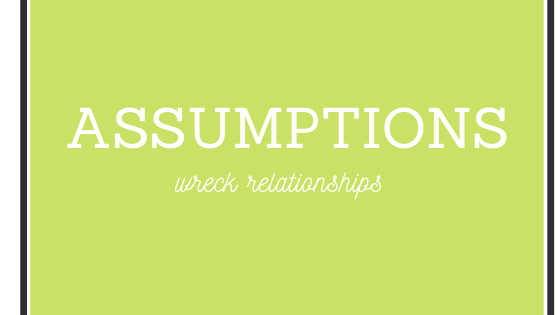You think you know. You think you know what’s going on in my head, in my life, in my everything. Why I blow up in anger, or why I’m withdrawn, why I use coke, why I skip school, why I’m silent when you essentially ask me WTF? God you probably think you know why I put jam on my toast. You think you know.
Well you don’t. Whether you have studied for five years, whether you have worked with troubled kids for ten, whether you have lived with me for fifteen, I have to tell you that you do not know. Why?
Because when you over-rely on what you know, you do not rely on what I know. What I know of my existence, what I have experienced, the thoughts and emotions that whirl around inside me. You might see outward manifestations of all of that, you might see my dysfunction, but you do not know my inner world.
The biggest tell-tale for me that you do not know is when you do not ask. It is when you tell me what I feel. It is when you tell me why I am doing what I’m doing and punish me on the basis of that. When the reality is that what you think about the situation has nothing to do with it or is so inconsequential in the bigger picture of who I am and what I think and feel.
And when you don’t ask, I slip further away. As hard as you might reach out your hand to catch me or help me, if you do not ask, the distance grows.
So what are the common assumptions that get in the way of you really knowing me? Of you really reaching me? Of really being able to communicate with me and help me? Of being able to see what we both need to do to make this relationship work, whether therapeutic, parental, educational, whatever?
Assumption 1: Motivation
So I’m doing something you don’t like, or you wish I’d stop doing. Maybe I’m repeatedly breaking a rule, maybe a curfew, or taking drugs, or continually being a pain in the the rear-end at school.
You assume that you know why I am doing this with the end result that you see everything through that lens. You then become closed to properly listening to me, because if what I say does not fit into your  understanding, it is at worst discounted, and at best, just not heard.
understanding, it is at worst discounted, and at best, just not heard.
For example, if you have decided that the reason why I walk out of class is because I’m a prima donna, love to be the centre of attention and can’t be bothered to do any work, then you are not going to hear me if I tell you that I do this because I am genuinely struggling with the sensory input of the classroom. That the scrape of the chairs, the buzzing and flickering of the lights and that kid tapping his pencil the whole damn time, is quite literally driving me mad. (For more on this Google ‘sensory processing disorder’).
In many ways, I’m doing quite well if you even ask me the question of why I keep on walking out, because most don’t even bother to do that. They just assume that I am doing it for those other reasons that have nothing to do with it, and never even bother to ask. Either way, I am silenced.
How to do it better?
Tell me that you really want to understand what is going on for me. Why do I keep on walking out? Try to resist the urge to offer suggestions as to why I’m walking out as that could potentially feed into my idea that you are clueless.
If I am really struggling to express myself, you could make some suggestions as to why you think I might be engaging in this behaviour, but make sure you always include the caveat that you really don’t know, you’re just including these suggestions to see if it helps, maybe it won’t.
A lot of the time I might not even really know what my motivations are. Which leads me to the second assumption.
Assumption 2: Articulation
Just because you can formulate your thoughts, identify emotions and express yourself, doesn’t mean that I can. Us teenagers can really struggle with this at the best of times because we are all undergoing a major brain makeover. Some of us are also contending with additional emotional and communication issues (whether identified and diagnosed or as is often the case, not).
Maybe I am dyslexic or have ADHD and really struggle to order my thoughts. Add into that the complication of trying to express them to someone else and you might get an idea of the little pieces of hell I experience multiple times a day.

If I am on the Autistic Spectrum I may be struggling to identify and label what I am feeling. I may just tell you repeatedly that “I can’t do it”, “I can’t do it”, “I hate school”, because that is literally all I know right now. I may not be able to tell you that I am anxious, that I am angry, to label my emotions. And to top it off, there is no hope of me being able to tell you what the reasons are for my behaviour because I am right in the middle of a flight-or-fight response. And remember, even when not in fight-or-flight I am may not be able to identify and express my emotions anyhow.
And because we find it so exhausting to express ourselves we will often give up. So maybe all you will get from me is silence. Which you then attach your assumption of “she’s being rude”, “disrespectful”, “he doesn’t give a damn”. If only you knew.
How to do it better?
Give me time. Accept that I may not be able to communicate on the first time of asking. Recognise that if I am feeling particularly emotional that this is the point at which I am least likely to communicate, or communicate well.
Always ask yourself first, does this kid have a diagnosis of anything? If I do, find out more about. Read about it. Ask anyone with expertise in this area, and ideally expertise in this area and knowledge of me individually. Ask me about it. This could be your road in to having a better relationship with me and understanding why I am behaving this way.
If you discuss it with me once the emotions have largely fallen away and you are still not getting anywhere, consider using an emotion chart, or mood cards. (see links below for tried-and-tested resources). This way I can look through the emotions and see if I can identify with some. Often there will be more than one going on at one time, which is what makes them so difficult for me to identify with- they get mushed up in my head and then I can’t express them. Having visual prompts simplifies this process, and helps me to see that I may be feeling more than one thing at once.
Or maybe you just need to wind it right back and not even try to get me to express how I am feeling. It is entirely possible that I need an Emotions 101 session, someone to spend some time with me, going through something like an emotion chart or mood cards and just discussing what those emotions look like on people’s faces, how they make people feel, the bodily sensations, before even considering whether I am feeling any of them in a given moment.
I may resent this process. I may think you are saying I’m stupid or something. In which case, make it clear that you’re just trying to understand and it can be difficult to find the words sometimes. Everyone can struggle to find the words at least sometimes.
If they are obviously really struggling to express themselves consider getting a specialist involved. Maybe there is an underlying issue such as dyslexia, ADHD, or autism, to name just a few which is limiting their ability to effectively communicate and may also lie at the root of why there are behavioural problems in the first place.
Assumption 3: Crystal ball
This one is often tied up with the motivation assumption. So you do ask me a question like, “What on earth are you doing?”, or maybe more neutrally, “Why did you feel the need to do that?” And before you give me a chance to even try to answer the question, you answer the question for me, often by asking more questions that aren’t really questions:
“Why is it that you feel it is okay to deliberately go around and disrupt the entire building?”. The assumption here is that I feel it is ok to disrupt the building. Maybe I really don’t feel it is ok, but I am under such a state of stress that I’m going around driven like a motor, not really knowing what I am doing.
Or maybe you don’t even go through the motions of even asking me about my motivations, because you’ve already had the conversation in your head, where you ask the question, and you decide what my answer is going to be. You then leap to the next step when you discuss the issue with me. You have assumed my motivations and reasons and go straight to consequence. Either way, you think you have a crystal ball and that you know what I am going to say in response to your questions, whether verbalised or not. And it then informs how you deal with me. But remember, these are words and responses that have not come from me, even though in your head you think they have.
How to do it better?
Simply, smash that crystal ball would you? 
“So what went on this afternoon?” is always going to be a more productive question than, “So what went on this afternoon, did you lose your temper again?” or “So what went on this afternoon? Have you been hanging around with Joe again?” Aside from anything else, you might just be feeding me convenient excuses for my behaviour that don’t get me anywhere nearer addressing my issues.
I may have a standard modus operandi. You may actually know me really well. But you can still fall down this particular assumption (or in this case for the grammer geeks out there, presumption) rabbit hole. Just because the last four times I did something for reason a, does not mean that this time it is not reason k. You must ask. You do not know unless you ask.
Constantly checking that you have understood me correctly, is the absolute bread and butter of good communication between us. So often I feel that I am not understood, that I have not been heard, so providing me with multiple opportunities to be understood, to be heard makes you an incredibly valuable person in my life. It becomes clear to me that you are someone who genuinely cares and will take the time to understand me, to sweep aside any assumptions that have been made by you and others.
So please constantly be asking these questions in your head when interacting with me:
1) Am I assuming I know what their motivation for this behaviour is?
2) Am I assuming that they can articulate their thoughts and feelings?
3) Am I putting thoughts and words into their mouths and not actually listening?
Do this and if you find you have been making assumptions, please take the necessary steps to hear directly from me. Take the time to really listen and it will change our relationship for the better and will always move us closer to positive change.
WANT TO LEARN MORE ABOUT HOW TO REACH TROUBLED TEENS? WATCH THIS….


